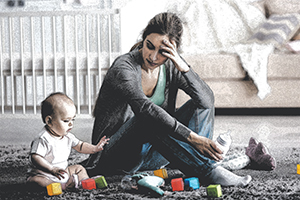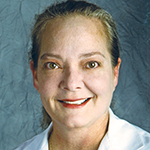Program is focused on minority and underserved women at higher risk of poor health outcomes
By LISA EISENHAUER
A pilot program underway at Loyola University Medical Center aims to improve the process for identifying mental health needs in expectant and new mothers and to smooth those mothers' paths to treatment.
Seed money for the program came from a $25,000 grant from the American Hospital Association's Institute for Diversity and Health Equity and Blue Cross Blue Shield of Illinois. The grant was one of 13 the two organizations awarded last year to Illinois hospitals or health care providers with a goal of reducing disparities in health care.

Postpartum depression, depicted in this photo illustration, often goes undiagnosed and untreated.
Loyola is using the funding to pay for training for staff in the obstetrics and psychiatry departments on how to screen obstetrics patients for mental health issues and how to provide appropriate care. Some of the grant is also going toward the costs of starting a group therapy program for pregnant and postpartum women experiencing depression.

Sharma
The academic medical center, part of Trinity Health, is in the western Chicago suburb of Maywood and cares for an ethnically and racially diverse population. In its service area, 38% of residents are in households with income below 200% of the federal poverty level.
Data-identified need
Dr. Aparna Sharma is an associate professor at the Loyola University Chicago Stritch School of Medicine. She directs Loyola Medicine's residency program for psychiatry and behavioral neurosciences. Sharma says Loyola has been missing an opportunity to provide needed screening for expectant and new mothers and doing them a disservice by not having adequate skill sets to care for their mental health needs.

Goodman
Sharma's partner in starting the perinatal mental health training program is Dr. Jean Ricci Goodman, a professor at Loyola's school of medicine. She is division director of maternal/fetal medicine, and medical director of obstetrical services and the medical perinatal center at Loyola University Medical Center.
The doctors point to data on the impact that the mental illness of mothers has on the women and on their babies. That data was gathered by the Illinois Department of Public Health and the Illinois Perinatal Quality Collaborative, a network dedicated to improving health outcomes for mothers and babies.
The data, published most recently in the Illinois Maternal Morbidity and Mortality Reportin October 2018, showed an average of 73 women died in Illinois within one year of pregnancy each year from 2008 to 2016 and that non-Hispanic Black women were six times more likely than white women to die of pregnancy-related complications. Mental health conditions were identified as the specific underlying cause in 11% of those deaths and as a contributing factor in 19%. Substance dependency is assessed separately from mental illness in the report.
Screenings and referrals
To learn the latest in best practices for identifying symptoms of psychiatric disorders during and after pregnancy and how to treat them, Loyola is tapping the specialized training offered by Postpartum Support International through its Perinatal Mental Health Certification Program. So far, eight clinicians, including doctors, nurses, therapists and social workers, have completed the eight-week online training.
Goodman and her team are now screening all their patients for depression and other mental health conditions at various points in their pregnancies and doing postpartum visits with new mothers at two weeks after delivery rather than waiting until six weeks. Those visits also include mental health screenings. The clinicians use the Edinburgh Postnatal Depression Scale, a 10-question screening for perinatal patients.
The starting goal of Loyola's program was to have the two-week postpartum visits with 80% of patients. Goodman says in February her team had the visits with all their patients, in some cases virtually. In the past, she says, only about 50% of patients were showing up for their six-week perinatal visits.
"We are hoping if we engage the patients at two weeks that they would come for their six-week visit," Goodman says.
Goodman says for some new mothers, especially those with complicated pregnancies, the early weeks after delivery can be especially challenging. "They deliver and things go OK, but it's like post-traumatic stress disorder," Goodman says of the emotional aftermath. "They've gone through this terrible stressful situation and then all comes out OK, but then they feel that nobody talks to them anymore. They think, 'Hey, I lost that advocate. I'm all by myself with the new baby and I'm exhausted.'"
Patients who the doctors or nurses identify as having or being at risk for mental health conditions get referrals to Sharma's team for care. Those referrals took place before the new program got started, but they were spotty. "OB providers, they knew that there was a women's mental health program, but they were not aware of any specific or specified channel, how to refer those patients to us," Sharma says.
Proper training
In addition, because few people in the psychiatry department were trained for caring for expectant and new mothers, she says the wait for an appointment could take months. "These patients, they need to be referred to appropriate or trained health care professionals in a timely manner, and they need to be engaged in treatment in a timely manner."
Appropriate treatment can include medication, counseling and group therapy, Sharma says. Her team is tracking the number of referrals as well as how many patients follow through and how many complete treatment for up to a year.
The group therapy component has been complicated by the COVID-19 pandemic, but Sharma's and Goodman's teams were in the process of getting it set up early this year. They plan to use part of the grant funding for iPads so that some mothers can participate in the group sessions virtually. They also plan to offer aid to cover other patient expenses, such as for transportation, and to provide babysitting services, if needed.
While the teams who are taking part are in the early stages of gathering research data on outcomes, Goodman says she already sees improvements for patients. One big improvement is the access to care from Sharma's team. "Patients seem happier, much more relaxed, it's much easier for them to engage," Goodman says.
Goodman hopes to find funding and other support to continue the program when the grant expires after one year. "We've been kicking around ideas of how to get community buy-in to support it going on," Goodman says. "It doesn't take a lot of money to support it. It's more about engagement and interest."